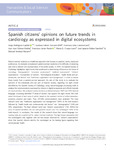Mostrar o rexistro simple do ítem
Spanish citizens’ opinions on future trends in cardiology as expressed in digital ecosystems
| dc.contributor.author | Rodríguez-Capitán, Jorge | |
| dc.contributor.author | Vaccaro-Witt, Gustavo Fabián | |
| dc.contributor.author | Cabrera-Lara, Francisco-Elías | |
| dc.contributor.author | Gómez Doblas, Juan José | |
| dc.contributor.author | Pavón, Francisco Javier | |
| dc.contributor.author | Crespo-Leiro, María Generosa | |
| dc.contributor.author | Peláez-Sánchez, José Ignacio | |
| dc.contributor.author | Jiménez-Navarro, Manuel | |
| dc.date.accessioned | 2022-09-08T07:57:29Z | |
| dc.date.available | 2022-09-08T07:57:29Z | |
| dc.date.issued | 2022-06 | |
| dc.identifier.citation | Rodríguez-Capitán, J., Vaccaro-Witt, G.F., Cabrera-Lara, F.E. et al. Spanish citizens’ opinions on future trends in cardiology as expressed in digital ecosystems. Humanit Soc Sci Commun 9, 208 (2022). https://doi.org/10.1057/s41599-022-01235-z | es_ES |
| dc.identifier.uri | http://hdl.handle.net/2183/31529 | |
| dc.description.abstract | [Abstract] Patient-centred medicine is a healthcare approach that focuses on patients’ wants, needs and preferences. An obstacle to implement patient-centred medicine is the difficulty of obtaining data that is relevant and representative of the whole society. In 2019, the Spanish Society of Cardiology highlighted eight trends that would exert a determining influence on the future of cardiology: “demographics”, “economic environment”, “political environment”, “citizens’ expectations”, “incorporation of women”, “technological innovation”, “health levels and cardiovascular risk factors” and “healthcare organisation and management”. In order to assess these trends from a pacient-centred approach, the aim of this study is to evaluate the opinions of the individuals who are part of Spanish society, regarding the eight trends identified by the Spanish Society of Cardiology, using natural language processing tools to analyse the communications expressed by citizens in digital ecosystems and official channels of communication. We analysed communications published between 2007 and 2019. Natural language processing identified 17 areas of opinion that support the eight trends. We evaluated the impact of each area of opinion based on the standard metrics of online reputation: presence, emotion and reach. Thus, 257,456 communications were analysed. The most relevant trend was “healthcare organisation and management” (54% of the total impact), followed by “health levels and cardiovascular risk factors” and “demographics” (14% and 10%, respectively). The least relevant trend was “citizens’ expectations” (1%). Within the areas of opinion identified, the one with greatest impact was “the cardiologist” (16% of the total impact). In conclusion, the results of this research show that natural language processing tools are a useful tool for patient-centred medicine. The high impact associated with the cardiologist’s role, together with the low impact observed for “citizen’s expectations” show that Spanish citizens identify the cardiologist as the leading figure regarding their cardiovascular health. | es_ES |
| dc.language.iso | eng | es_ES |
| dc.publisher | Springer | es_ES |
| dc.relation.uri | https://doi.org/10.1057/s41599-022-01235-z | es_ES |
| dc.rights | Atribución 3.0 España | es_ES |
| dc.rights.uri | http://creativecommons.org/licenses/by/3.0/es/ | * |
| dc.subject | Cardiología | es_ES |
| dc.subject | Cardioloxía | es_ES |
| dc.subject | Cardiology | es_ES |
| dc.subject | Patient-centred medicine | es_ES |
| dc.subject | Medicina centrada en el paciente | es_ES |
| dc.subject | Medicina centrada no paciente | es_ES |
| dc.title | Spanish citizens’ opinions on future trends in cardiology as expressed in digital ecosystems | es_ES |
| dc.type | info:eu-repo/semantics/article | es_ES |
| dc.rights.access | info:eu-repo/semantics/openAccess | es_ES |
| UDC.journalTitle | Humanities & Social Sciences Communications | es_ES |
| UDC.volume | 9 | es_ES |
| UDC.startPage | 208 | es_ES |
Ficheiros no ítem
Este ítem aparece na(s) seguinte(s) colección(s)
-
GI- GRINCAR - Artigos [203]






